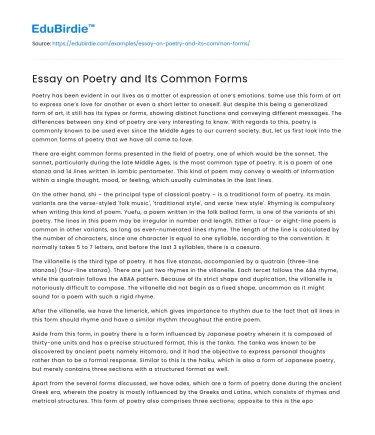Poetry has been evident in our lives as a matter of expression of one’s emotions. Some use this form of art to express one’s love for another or even a short letter to oneself. But despite this being a generalized form of art, it still has its types or forms, showing distinct functions and conveying different messages. The differences between any kind of poetry are very interesting to know. With regards to this, poetry is commonly known to be used ever since the Middle Ages to our current society. But, let us first look into the common forms of poetry that we have all come to love.
There are eight common forms presented in the field of poetry, one of which would be the sonnet. The sonnet, particularly during the late Middle Ages, is the most common type of poetry. It is a poem of one stanza and 14 lines written in iambic pentameter. This kind of poem may convey a wealth of information within a single thought, mood, or feeling, which usually culminates in the last lines.
Save your time!
We can take care of your essay
- Proper editing and formatting
- Free revision, title page, and bibliography
- Flexible prices and money-back guarantee
On the other hand, shi – the principal type of classical poetry – is a traditional form of poetry. Its main variants are the verse-styled 'folk music', 'traditional style', and verse 'new style'. Rhyming is compulsory when writing this kind of poem. Yuefu, a poem written in the folk ballad form, is one of the variants of shi poetry. The lines in this poem may be irregular in number and length. Either a four- or eight-line poem is common in other variants, as long as even-numerated lines rhyme. The length of the line is calculated by the number of characters, since one character is equal to one syllable, according to the convention. It normally takes 5 to 7 letters, and before the last 3 syllables, there is a caesura.
The villanelle is the third type of poetry. It has five stanzas, accompanied by a quatrain (three-line stanzas) (four-line stanza). There are just two rhymes in the villanelle. Each tercet follows the ABA rhyme, while the quatrain follows the ABAA pattern. Because of its strict shape and duplication, the villanelle is notoriously difficult to compose. The villanelle did not begin as a fixed shape, uncommon as it might sound for a poem with such a rigid rhyme.
After the villanelle, we have the limerick, which gives importance to rhythm due to the fact that all lines in this form should rhyme and have a similar rhythm throughout the entire poem.
Aside from this form, in poetry there is a form influenced by Japanese poetry wherein it is composed of thirty-one units and has a precise structured format, this is the tanka. The tanka was known to be discovered by ancient poets namely Hitomaro, and it had the objective to express personal thoughts rather than to be a formal response. Similar to this is the haiku, which is also a form of Japanese poetry, but merely contains three sections with a structured format as well.
Apart from the several forms discussed, we have odes, which are a form of poetry done during the ancient Greek era, wherein the poetry is mostly influenced by the Greeks and Latins, which consists of rhymes and metrical structures. This form of poetry also comprises three sections; opposite to this is the epode.
Lastly, the last form of poetry given is the ghazal, which consists of lines that have an identical beat to it. It is influenced by several poetry from different countries, but mostly Arabic; this has the objective of showing love or divinity that is unattainable, with regards to this it also has five to fifteen rhyming couplets in accordance with the preference of the author.
With the forms of poetry said and the objective and history discussed, I believe that the variety and the freedom this type of art gives is a privilege that everyone has. Despite the difference each poem gives, each meaning is said from the heart, and this gives the person who will be receiving the poetry a feeling that only they could feel. So, regardless of having a blank piece of art in your hands, you could still create poetry that is sacred and appreciated. Poetry breaks all boundaries of language, because once a poem is read and felt by the reader, it stays with them forever.






 Stuck on your essay?
Stuck on your essay?

